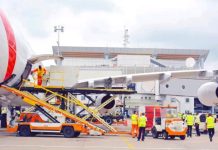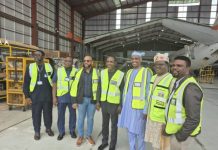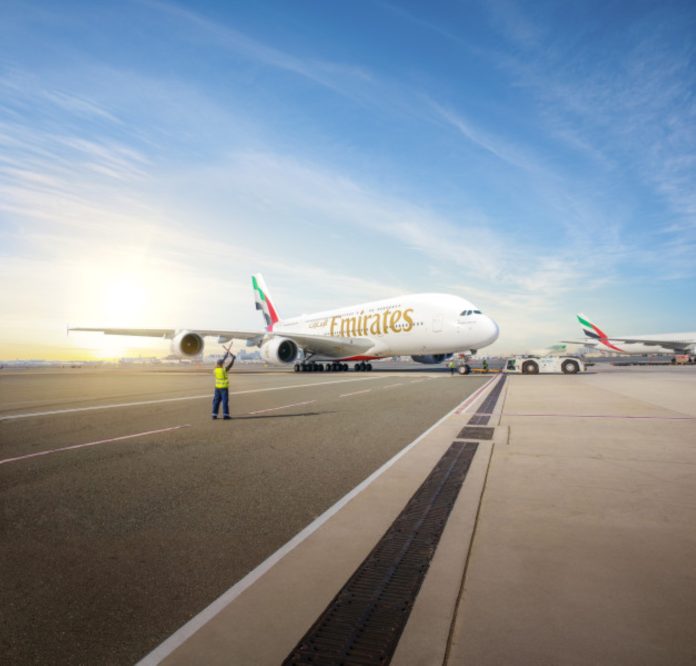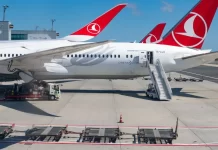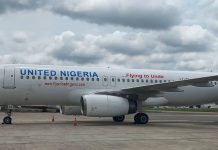The Emirates Group has achieved a new milestone in its financial performance, posting a record profit before tax of AED 12.2 billion (US$ 3.3 billion) for the first half of the 2025–26 financial year. This marks the Group’s fourth consecutive year of record-breaking profitability for the half-year period. After accounting for income tax charges, profit after tax stood at AED 10.6 billion (US$ 2.9 billion), representing a 13% increase over the same period last year.
Group revenue rose by 4% to AED 75.4 billion (US$ 20.6 billion), up from AED 70.8 billion (US$ 19.3 billion) in the previous year. The Group maintained a robust EBITDA of AED 21.1 billion (US$ 5.7 billion), reflecting its strong operational efficiency. As of September 30, 2025, the Group’s cash balance reached an all-time high of AED 56.0 billion (US$ 15.2 billion), compared to AED 53.4 billion (US$ 14.6 billion) at the end of March 2025.
This strong liquidity position has enabled the Group to fund new aircraft deliveries, meet debt obligations, and complete the payment of the remaining AED 2 billion (US$ 545 million) dividend to its owner, part of the AED 6 billion (US$ 1.6 billion) declared for the 2024–25 financial year.
His Highness Sheikh Ahmed bin Saeed Al Maktoum, Chairman and Chief Executive of Emirates Airline and Group, described the results as a testament to the company’s strategic discipline and resilience.
“The Group has once again delivered an outstanding performance, surpassing last year’s half-year results to achieve a new record profit for H1 2025–26. Emirates remains the world’s most profitable airline for this reporting period. This performance reflects the unflagging demand and growing customer preference for our products and services,” he said.
He highlighted that sustained investment in innovation, service excellence, and employee welfare continues to drive the Group’s success. “Emirates and dnata have invested billions to enhance our operations, products, and technology, while prioritising our employees who ensure our customers’ safety and satisfaction. These are core to our DNA. Our strong profitability enables us to keep scaling our business models in line with Dubai’s growth as a global hub for talent, business, and tourism,” Sheikh Ahmed stated.
Emirates Airline recorded its best-ever half-year profit before tax of AED 11.4 billion (US$ 3.1 billion), a 17% increase from the previous year’s AED 9.7 billion (US$ 2.6 billion). Profit after tax was AED 9.9 billion (US$ 2.7 billion), up 13%, while revenue grew by 6% to AED 65.6 billion (US$ 17.9 billion). The airline attributed this growth to strong and sustained travel demand across all regions, particularly in premium cabins. Emirates’ operating costs rose by 4% in line with higher capacity, with fuel remaining its largest expense component at 30% of total operating costs.
During the first half of the year, Emirates carried 27.8 million passengers, a 4% increase from the same period in 2024–25, with an average passenger seat factor of 79.5%. Capacity, measured in available seat kilometres, grew by 5%, driven by network expansion and the addition of new routes to Da Nang, Siem Reap, Shenzhen, and Hangzhou. By September 30, 2025, Emirates operated to 153 destinations across 81 countries and territories.
The airline also strengthened partnerships through new codeshare and interline agreements with Air Seychelles, Condor, and Aurigny, expanding customer connectivity options. Between April and September, Emirates took delivery of five new Airbus A350 aircraft and completed the retrofit of 23 aircraft as part of its US$ 5 billion cabin modernisation programme.
The introduction of Premium Economy service was extended to 61 cities worldwide. On the ground, Emirates unveiled “Emirates First,” a dedicated private check-in area for First Class passengers and Platinum Skywards members at Dubai International Airport, and opened new retail concept stores in cities including Accra, Geneva, Seoul, and Singapore.
Emirates SkyCargo moved 1.25 million tonnes of cargo, up 4% from last year, supported by the addition of three new Boeing 777 freighters and the launch of Emirates Courier Express. However, cargo yields softened by 6% due to global tariff concerns. The airline continued to expand its sustainability initiatives, using sustainable aviation fuel (SAF) where available, and joined the Aviation Circularity Consortium (ACC) to advance circular economy practices in the aviation supply chain.
The airline also intensified its global brand presence through strategic sponsorships, including partnerships with FC Bayern Munich, Real Madrid Basketball, the European Professional Club Rugby (EPCR) tournaments, ATP Tour, and Olympique Lyonnais. Emirates’ EBITDA for the period stood at AED 19.7 billion (US$ 5.4 billion), up 3% year-on-year.
dnata also delivered record results for the half year, reporting revenue of AED 11.7 billion (US$ 3.2 billion), up 13% from AED 10.4 billion (US$ 2.8 billion) in the same period last year. Profit before tax rose 17% to AED 843 million (US$ 230 million), while profit after tax increased 22% to AED 697 million (US$ 190 million). Its EBITDA climbed to AED 1.4 billion (US$ 372 million), up 5%.
dnata’s airport operations contributed AED 5.5 billion (US$ 1.5 billion) to total revenue, a 15% increase, handling 450,903 aircraft turns and 1.59 million tonnes of cargo across key markets such as Italy, Australia, the UK, and the UAE. The catering and retail division generated AED 4.1 billion (US$ 1.1 billion), up 11%, driven by increased production in Australia and the UK and the growth of its retail product offering. dnata Travel recorded AED 2.0 billion (US$ 538 million) in revenue, a rise of 11%, with total transactional value increasing to AED 5.0 billion (US$ 1.4 billion).
The company continued to invest strategically, announcing a US$ 110 million plan to deploy 800 new low-emission ground support equipment units across its network in 2025. Other notable developments included the launch of marhaba airport hospitality in the UK, a €3 million minority stake in WonderMiles, and the sale of its 75% stake in Super Bus. dnata also entered its first major sports sponsorship deal as a Founding Partner of Dubai Basketball.
Reflecting its strong business fundamentals, the Emirates Group’s total workforce grew by 3% to 124,927 employees by September 30, 2025. Sheikh Ahmed noted that despite global challenges, demand for air travel and related services remains robust. He expressed confidence that the Group will sustain its momentum as new A350 aircraft join the Emirates fleet and dnata expands its facilities, reinforcing Dubai’s position as a world-leading aviation hub.


